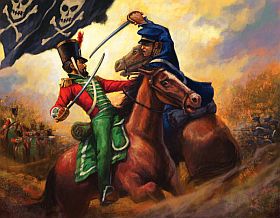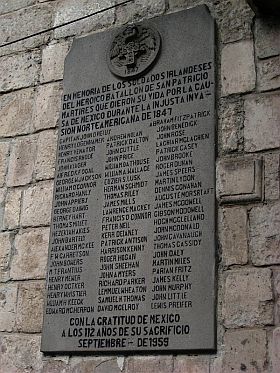It is often said that “Everyone is Irish on St. Patrick’s Day,” but to Mexicans this celebration has a special meaning of historical importance.
PTLIA.- The St. Patrick’s Brigade, also known as the Saint Patrick’s Battalion or Los San Patricios, were Irishmen who fought and gave their lives for Mexico in the Mexican American War.

The United States annexation of Texas in 1845 was the primary cause of the Mexican American War (1846-1848). During this period Irish immigrants came to the United States for several reasons all related to British rule and intolerance. Religious prejudice against Irish Catholics and British landowner’s decision to export food for profit rather than feed the Irish led to what has been mistakenly referred to as the Irish Potato Famine. The An Gorta Mor, Irish for the “Great Hunger,” resulted in mass immigration to the U.S.
As seen in Martin Scorsese’s Gangs of New York, Irish immigrants joined the Army in order to gain a path to citizenship. After their inscription into the army these Irish immigrants were sent West to fight in what would ultimately become the war with Mexico.
These Irish soldiers noticed many similarities between their treatment by England and what the United States was trying to do to Mexico. Additionally these Irish soldiers were treated poorly by their Protestant officers and never really liked the idea of fighting a Catholic country like Mexico. The US army would not allow Irish soldiers to attend mass and many began to cross over into Mexico on Sundays to attend religious services. Soldiers who had fought against each other all week quickly became friends after realizing their common religious bond and struggle from oppressive actions of primarily English countries.

Led by Captain John Riley, approximately 800 soldiers left the US army to join the Mexicans in their fight against the United States. Irish soldiers who left to fight for Mexico before war was officially proclaimed were considered deserters while those who left after were labeled defectors by the United States Army. To the Mexicans they were considered heroes and called “Los San Patricios,” the Saint Patrick’s Brigade or Los Colorados because of their red hair. The San Patricios were fierce fighters who knew they would be put to death by US troops if captured. Knowing their fate they refused to surrender and were responsible for large numbers of casualties to the US Army forces. Mexican General Santa Anna said that if he had a few hundred more men like the San Patricios, Mexico would have won the Battle of Churubusco and ultimately the Mexican American War.
After the war was lost, Mexico ceded half of its land to the United States. Captured members of the St. Patrick’s Battalion who deserted the US Army before war was officially announced had their faces branded with the letter “D”. Those who left the US Army to fight for Mexico after war was announced were considered traitors and hung. Over a two day period the US Army lynched 50 members of the St. Patrick’s Brigade in what is considered to be the largest lynching in US military history and an example of national intolerance to the Irish.
Mexicans honor the San Patricios, or St. Patrick’s Brigade, with celebrations on September 12, the anniversary of their lynching by the US Army, and on March 17th. In San Angel, a suburb of Mexico City, a plaque lists the names of the Irish San Patricios who died while fighting to prevent United States domination of Mexico.
In 1997, President Ernesto Zedillo invited Irish dignitaries to Mexico to commemorate the 150th anniversary of the execution of the San Patricios at a ceremony in Mexico City’s San Jacinto Plaza. This is where the U.S. Army conducted the first 16 hangings after the men were convicted of desertion at court martial. Ireland and Mexico jointly issued commemorative postage stamps to mark the anniversary.
In 2004, at an official ceremony attended by numerous international dignitaries, including directors Lance and Jason Hool, as well as several actors from the film One Man’s Hero (1999), the Mexican government gave a commemorative statue to the Irish government in perpetual thanks for the bravery, honor and sacrifice of the Saint Patrick’s Battalion. The statue was erected in Clifden, Connemara, Ireland, where leader Jon Riley was born.
The battalion has inspired numerous responses: it was evoked in a Saint Patrick’s Day message from Subcomandante Marcos of the Zapatista Army of National Liberation, and has been remembered as a symbol of international solidarity with Mexico. In honor of Jon Riley, every year on September 12, the town of Clifden flies the Mexican flag.
So when you’re raising your glass of green beer on St. Patty’s Day, don’t forget to say “Viva Los San Patricios!”
It is often said that “Everyone is Irish on St. Patrick’s Day,” but to Mexicans this celebration has a special meaning of historical importance.
PTLIA.- The St. Patrick’s Brigade, also known as the Saint Patrick’s Battalion or Los San Patricios, were Irishmen who fought and gave their lives for Mexico in the Mexican American War.

The United States annexation of Texas in 1845 was the primary cause of the Mexican American War (1846-1848). During this period Irish immigrants came to the United States for several reasons all related to British rule and intolerance. Religious prejudice against Irish Catholics and British landowner’s decision to export food for profit rather than feed the Irish led to what has been mistakenly referred to as the Irish Potato Famine. The An Gorta Mor, Irish for the “Great Hunger,” resulted in mass immigration to the U.S.
As seen in Martin Scorsese’s Gangs of New York, Irish immigrants joined the Army in order to gain a path to citizenship. After their inscription into the army these Irish immigrants were sent West to fight in what would ultimately become the war with Mexico.
These Irish soldiers noticed many similarities between their treatment by England and what the United States was trying to do to Mexico. Additionally these Irish soldiers were treated poorly by their Protestant officers and never really liked the idea of fighting a Catholic country like Mexico. The US army would not allow Irish soldiers to attend mass and many began to cross over into Mexico on Sundays to attend religious services. Soldiers who had fought against each other all week quickly became friends after realizing their common religious bond and struggle from oppressive actions of primarily English countries.

Led by Captain John Riley, approximately 800 soldiers left the US army to join the Mexicans in their fight against the United States. Irish soldiers who left to fight for Mexico before war was officially proclaimed were considered deserters while those who left after were labeled defectors by the United States Army. To the Mexicans they were considered heroes and called “Los San Patricios,” the Saint Patrick’s Brigade or Los Colorados because of their red hair. The San Patricios were fierce fighters who knew they would be put to death by US troops if captured. Knowing their fate they refused to surrender and were responsible for large numbers of casualties to the US Army forces. Mexican General Santa Anna said that if he had a few hundred more men like the San Patricios, Mexico would have won the Battle of Churubusco and ultimately the Mexican American War.
After the war was lost, Mexico ceded half of its land to the United States. Captured members of the St. Patrick’s Battalion who deserted the US Army before war was officially announced had their faces branded with the letter “D”. Those who left the US Army to fight for Mexico after war was announced were considered traitors and hung. Over a two day period the US Army lynched 50 members of the St. Patrick’s Brigade in what is considered to be the largest lynching in US military history and an example of national intolerance to the Irish.
Mexicans honor the San Patricios, or St. Patrick’s Brigade, with celebrations on September 12, the anniversary of their lynching by the US Army, and on March 17th. In San Angel, a suburb of Mexico City, a plaque lists the names of the Irish San Patricios who died while fighting to prevent United States domination of Mexico.
In 1997, President Ernesto Zedillo invited Irish dignitaries to Mexico to commemorate the 150th anniversary of the execution of the San Patricios at a ceremony in Mexico City’s San Jacinto Plaza. This is where the U.S. Army conducted the first 16 hangings after the men were convicted of desertion at court martial. Ireland and Mexico jointly issued commemorative postage stamps to mark the anniversary.
In 2004, at an official ceremony attended by numerous international dignitaries, including directors Lance and Jason Hool, as well as several actors from the film One Man’s Hero (1999), the Mexican government gave a commemorative statue to the Irish government in perpetual thanks for the bravery, honor and sacrifice of the Saint Patrick’s Battalion. The statue was erected in Clifden, Connemara, Ireland, where leader Jon Riley was born.
The battalion has inspired numerous responses: it was evoked in a Saint Patrick’s Day message from Subcomandante Marcos of the Zapatista Army of National Liberation, and has been remembered as a symbol of international solidarity with Mexico. In honor of Jon Riley, every year on September 12, the town of Clifden flies the Mexican flag.
So when you’re raising your glass of green beer on St. Patty’s Day, don’t forget to say “Viva Los San Patricios!”

